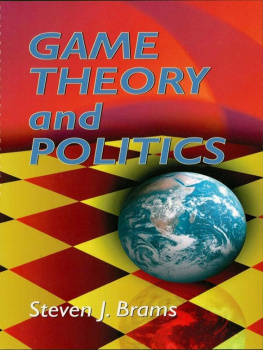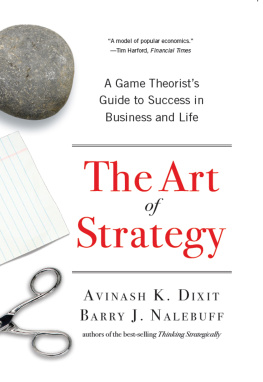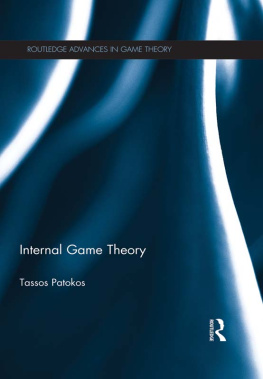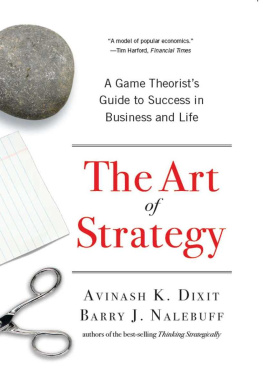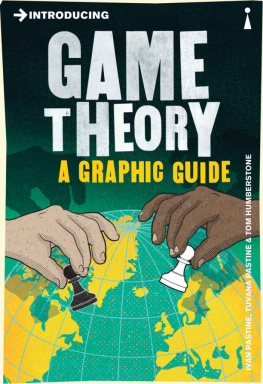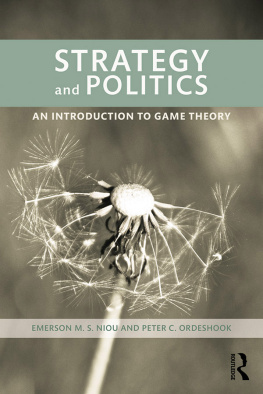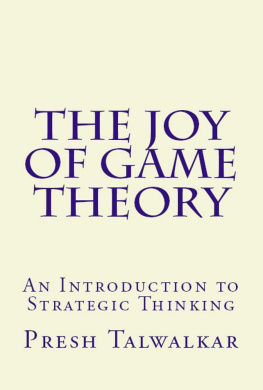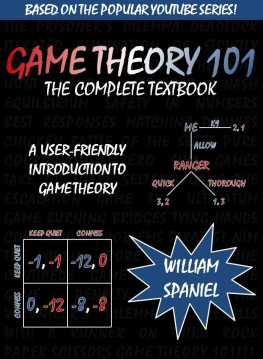Brams - Game theory and politics
Here you can read online Brams - Game theory and politics full text of the book (entire story) in english for free. Download pdf and epub, get meaning, cover and reviews about this ebook. City: Mineola, N.Y, year: 2004, publisher: Dover Publications, genre: History. Description of the work, (preface) as well as reviews are available. Best literature library LitArk.com created for fans of good reading and offers a wide selection of genres:
Romance novel
Science fiction
Adventure
Detective
Science
History
Home and family
Prose
Art
Politics
Computer
Non-fiction
Religion
Business
Children
Humor
Choose a favorite category and find really read worthwhile books. Enjoy immersion in the world of imagination, feel the emotions of the characters or learn something new for yourself, make an fascinating discovery.
Game theory and politics: summary, description and annotation
We offer to read an annotation, description, summary or preface (depends on what the author of the book "Game theory and politics" wrote himself). If you haven't found the necessary information about the book — write in the comments, we will try to find it.
Game theory and politics — read online for free the complete book (whole text) full work
Below is the text of the book, divided by pages. System saving the place of the last page read, allows you to conveniently read the book "Game theory and politics" online for free, without having to search again every time where you left off. Put a bookmark, and you can go to the page where you finished reading at any time.
Font size:
Interval:
Bookmark:
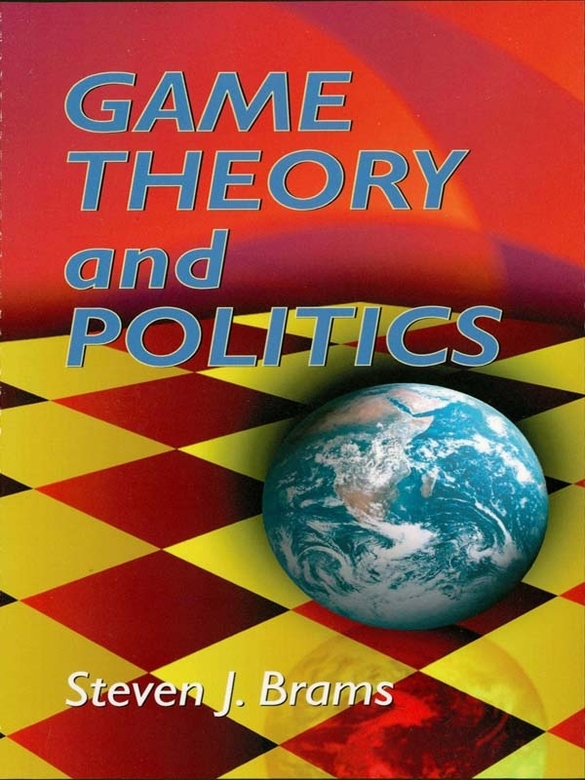
I would like to thank Roman Frydman, Richard D. McKelvey, Kenneth A. Shepsle, and Frank C. Zagare for carefully reading a first draft of this book, making many helpful suggestions, and detecting several errors; all should be absolved of deficiencies that remain in the book. I also want to thank Donna S. Welensky for quickly and skillfully typing the manuscript. Arthur L. Iamele of The Free Press offered valuable support from the beginning of this project. Ellen Simon, also of The Free Press, was very helpful in the editing of the manuscript. I am indebted to several publishers and journals, specifically acknowledged in the footnotes, for permission to use material from previously published sources. Finally, I am grateful to my wife, Eva, who gracefully endured a six-month period of relative isolation, in the process of raising a family, while this book was being written.
This is a very selective bibliography of books chosen on the basis of two criteria: (1) that the treatment of game theory be relatively nonspecialized; (2) that the discussion or examples involve applications, or at least be potentially relevant, to politics (broadly conceived). The classification of books by levels means roughly the following:
Elementary: Requires virtually no mathematical background.
Intermediate: Although the mathematics used is not generally advanced, concepts and ideas are developed fairly rigorously and extensive use is often made of mathematical symbolism.
Advanced: Primarily mathematical works that require a high level of mathematical sophistication.
Davis, Morton D. Game Theory: A Nontechnical Introduction. New York: Basic Books, 1970.
As its subtitle implies, this book uses almost no mathematics. Yet it offers a rather sophisticated treatment of the subject matter of game theory and also contains many provocative (though mostly hypothetical) examples.
McDonald, John. Strategy in Poker, Business and War. New York: W. W. Norton & Co., 1950.
The first popular treatment of game theory, which also includes a discussion of games of chance, viz., poker; contains some delightful illustrations.
Rapoport, Anatol. Fights, Games, and Debates. Ann Arbor, Mich.: University of Michigan Press, 1960.
About one-third of this book is devoted to a discussion, with examples, of elementary game theory. The contrast between games, on the one hand, and fights and debates on the other, provides a useful perspective on different approaches that have been used to study cooperation and conflict in social situations.
Shubik, Martin (ed.). Game Theory and Related Approaches to Social Behavior. New York: John Wiley & Sons, 1964.
A rather diffuse collection of articles containing a useful expository essay by the editor.
Singleton, Robert R., and William F. Tyndall. Games and Programs: Mathematics for Modeling. San Francisco: W. H. Freeman, 1974.
Includes a description of the relationship between game theory and linear programming.
Farquharson, Robin. Theory of Voting. New Haven, Conn.: Yale University Press, 1969.
An elegant treatment of strategic voting that is marred by numerous errors. Many details are omitted from the analysis, making its appearance deceptively simple.
Luce, R. Duncan, and Howard Raiffa. Games and Decisions: Introduction and Critical Survey. New York: John Wiley & Sons, 1957.
A superb treatment of applied game theory and related topics, though now somewhat dated.
Rapoport, Anatol (ed.). Game Theory as a Theory of Conflict Resolution.
Dordrecht-Holland: D. Reidel Publishing Co., 1974.
Although this volume contains some purely mathematical contributions, theyalong with the more empirically oriented articlesraise questions of an applied nature relevant to the study of real-life conflicts and their resolution.
Rapoport, Anatol. N-Person Game Theory: Concepts and Applications.
Ann Arbor, Mich.: University of Michigan Press, 1970.
Rapoport, Anatol. Two-Person Game Theory: The Essential Ideas. Ann Arbor, Mich.: University of Michigan Press, 1966.
Both books are characterized by a strenuous effort on the part of the author to explain verbally the intuitive meaning of mathematical concepts.
Rapoport, Anatol, and Albert M. Chammah. Prisoners Dilemma: A Study in Conflict and Cooperation. Ann. Arbor. Mich.: University of Michigan Press, 1965.
A review of mathematical and empirical research up to 1965 on game theorys most famous game.
Riker, William H. The Theory of Political Coalitions. New Haven, Conn.: Yale University Press, 1962.
The first major application of n -person game theory in political science and now a modern classic that has stimulated numerous subsequent studies.
Schelling, Thomas C. The Strategy of Conflict. Cambridge, Mass.: Harvard University Press, 1960.
A critique of classical game theory with suggestions for its reorientation, especially as applied to the analysis of bargaining in international relations.
Burger, Ewald. Introduction to the Theory of Games, translated by John E. Freund. Englewood Cliffs, N.J.: Prentice-Hall, 1963.
Good coverage of most major topics.
Dresher, Melvin. Games of Strategy: Theory and Applications. Englewood Cliffs, N.J.: Prentice-Hall, 1961.
Contains several well-developed examples relevant to the study of defense and military strategy.
Howard, Nigel. Paradoxes of Rationality: Theory of Metagames and Political Behavior. Cambridge, Mass.: MIT Press, 1971.
A major extension of classical game theory with applications to the study of international conflict.
Owen, Guillermo. Game Theory. Philadelphia: W. B. Saunders Co., 1968.
A widely used mathematics textbook.
Parthasarathy, T., and T. E. S. Raghavan. Some Topics in Two-Person Games. New York: American Elsevier Publishing Co., 1971.
The best modern treatment of two-person game theory.
von Neumann, John, and Oskar Morgenstern. Theory of Games and Economic Behavior. Princeton, N.J.: Princeton University Press, 1944, 1947, 1953.
The classic study, for which perseverance pays; remarkable in its breadth and depth of coverage, especially as the original work in the field.
Most discussions of game theory in the international relations literature hardly go beyond a presentation of a few hypothetical examples used in general expository treatments of the subject. Although some vague analogies are usually drawn to situations of conflict and cooperation in international relations, there seems to be little in the substance of international relations that has inspired rigorous applications of the mathematics of game theory. An exception is the considerable work (some classified) that has been done on specific problems related to the use and control of weapons systems (e.g., targeting of nuclear weapons, violation of arms inspection agreements, search strategies in submarine warfare), but these are not problems of general strategic interest.
Given this dichotomy between general but vague and rigorous but specialized studies in international relations, we shall try to tread a middle ground in our discussion of applications. At a mostly informal level, we shall indicate with several real-life examples the relevance of game-theoretic reasoning to the analysis of different conflict situations in the international arena. At a more formal level, we shall develop some of the mathematics and prove one theorem in two-person game theory that seem particularly pertinent to the identification of optimal strategies and equilibrium outcomes in international relations games.
Font size:
Interval:
Bookmark:
Similar books «Game theory and politics»
Look at similar books to Game theory and politics. We have selected literature similar in name and meaning in the hope of providing readers with more options to find new, interesting, not yet read works.
Discussion, reviews of the book Game theory and politics and just readers' own opinions. Leave your comments, write what you think about the work, its meaning or the main characters. Specify what exactly you liked and what you didn't like, and why you think so.

